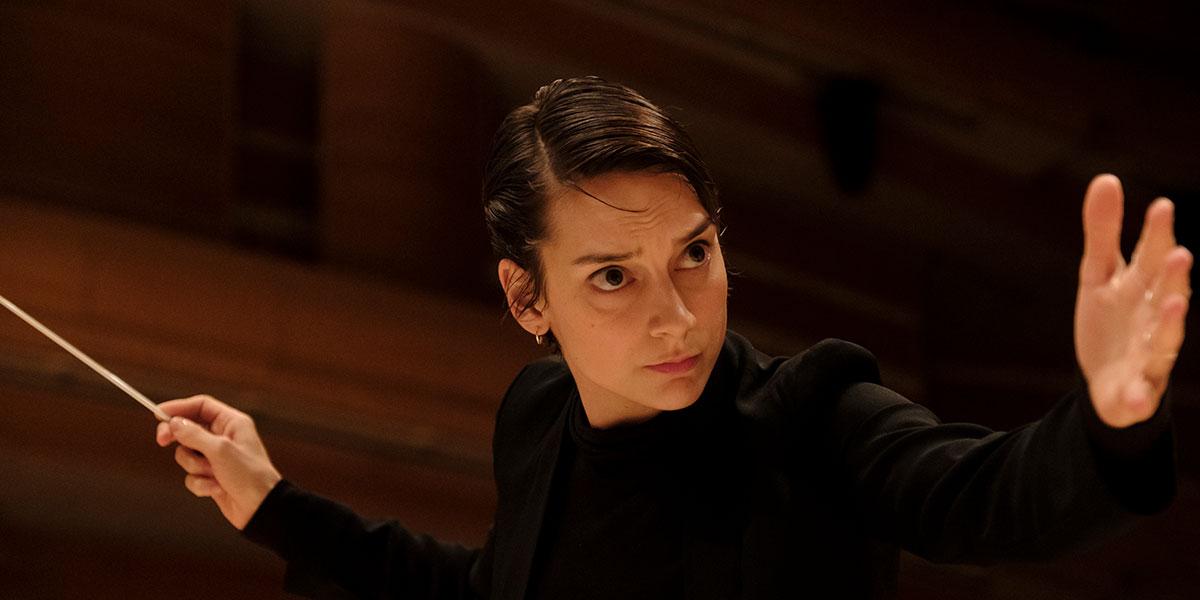Gifted young conductor Emma (Sophie Desmarais) has a real knack for musicality and is steadily becoming a prominent figure in Quebec’s classical music scene. When a chance arises to secure a central position in an orchestra, she leaps at the opportunity, excited to make her mark and take the next step into greatness. While her professional life seems promising, her personal life is in disarray. Her girlfriend Naëlle (Nour Belkhiria), a single mother and cellist in the orchestra, is struggling to commit with her ex-husband looming. The marriage of Emma’s parents seems to be on the rocks, and she has a troubling relationship with her controlling father Patrick (Sylvain Marcel), who also works as her agent. This dynamic is central to director Chloé Robichaud’s Days of Happiness (Les jours heureux), her third feature film after 2016’s Boundaries and 2013’s Sarah Prefers to Run, which also stars Desmarais. The French-language feature is currently playing in Quebec and select theatres elsewhere in North America.
While the familial relationship between Emma and her father is rocky, it’s his role as her agent that begins to cloud her professional life and dream career. Emma is enthusiastic and agreeable, but Patrick is far more aggressive, which leads to interpersonal conflicts as he tries to get Emma to perform to perfection, and get orchestra management to place her in a permanent position. Emma is creatively and emotionally stifled and must take this time—which happens to be the most stressful moment in her entire life—to realize if she wants to achieve the true happiness that’s long eluded her, she had better be willing to fight for it.
Days of Happiness is a bit of a victim of bad timing—there’s no skirting around the fact that Tár, another movie about a lesbian conductor, was released last year written and directed by Todd Field. The new film’s comparison to the Cate Blanchett-led best-picture nominee is inevitable. After all, there aren’t many films about lesbian conductors (or just conductors, or even just lesbians). While both Tár and Days of Happiness are similar in theory, the films couldn’t be further apart. Robichaud’s approach is considerably more humane than Field’s, with a great deal more sympathy invested in its characters; particularly Emma. While Lydia Tár is a hugely accomplished, towering figure, Emma is trying to achieve what Lydia already has—albeit, without the swathe of conflicts that Lydia is embroiled in. And while you root for Lydia to fail, Robichaud makes sure you’re investing in Emma’s success.
A passion for classical music drives the film—and Emma. Music is always at the forefront; Days of Happiness is divided into chapters based on the symphony (Mahler’s fifth) that Emma will be conducting with the orchestra. And the scenes where Emma is in her element, conducting, are magical; a normally quiet and reserved woman explodes with passion and vibrancy. In these moments, Emma has a commanding presence, a control she sorely lacks in other aspects of her life. It’s thrilling to watch; these scenes are the most exhilarating part of Days of Happiness.

Even for those who don’t care for classical music (or don’t think they do), Days of Happiness allows the timeless nature of the genre to flow through the drama. Through Desmarais’s physicality, we see a woman in complete command; when conducting, she has everything she could ever want.
Emma doesn’t really lead a double life, but Desmarais does impressive work showing the subtle yet distinct way Emma changes when not at work. With her girlfriend, the passion is clear, but Emma struggles to tell her exactly how she feels and what she wants, perhaps fearful of the harsh, cutting responses she’s become used to thanks to her father. There’s still a touching warmth to these scenes, even if it feels like the relationship between Emma and Naëlle could be pushed further.
At times it feels as if Days of Happiness is playing things too safely. The performances are great, and Emma is an exciting character you can get behind, but the film doesn’t seem particularly interested in pushing boundaries, delivering a fairly predictable tale of finding yourself. But then the film comes together brilliantly, with a fantastic final conducting sequence where Emma, while conducting, finally puts the pieces of her past together in breathtaking fashion, with Robichaud effectively cutting between Emma and her past to paint a vivid portrait of how she’s gotten to where she is, and what’s next.


 Why you can trust Xtra
Why you can trust Xtra


